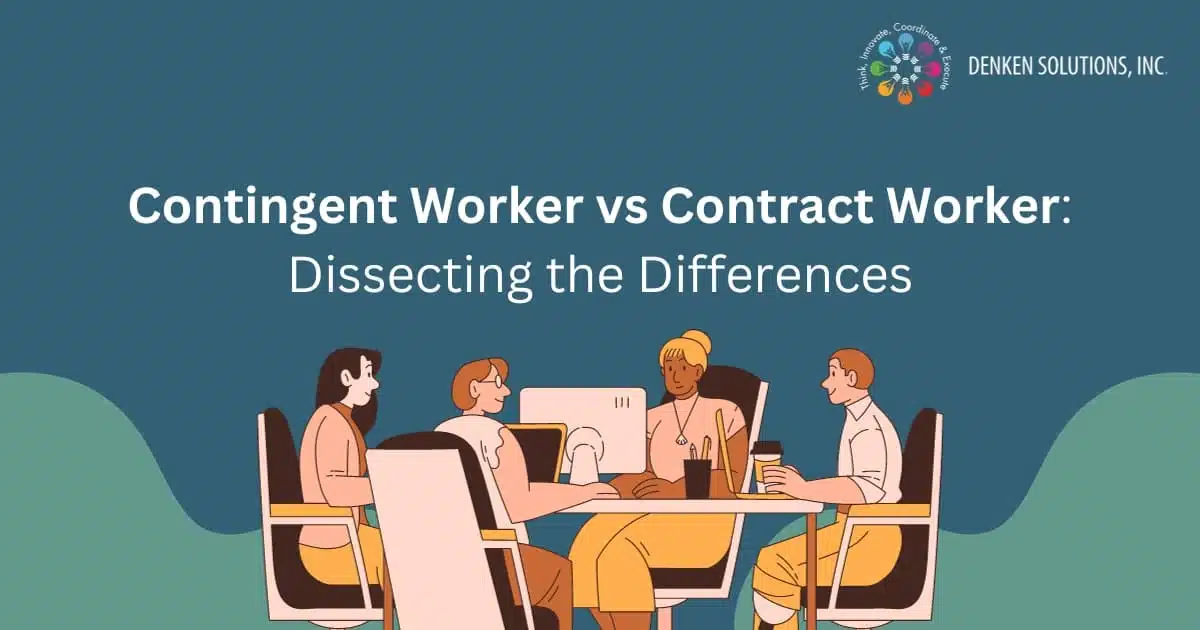With the constant progression of the modern workforce ever since the pandemic, employment relationships have considerably changed. Two types of employment that are often considered the same but hold different meanings are ‘contingent worker’ and ‘contractor’ or ‘contract employee.Both employees and employers must have a proper understanding of the differences between contingent workers and contract workers to set up and implement the right working conditions and practices. This article is focused on evaluating the key differences between these two types of employment while exploring staffing solutions services that can streamline the process.while also considering inclusive staffing approaches to ensure diversity in hiring.
Who is a contingent worker?
As defined by the U.S. Department of Labor, contingent workers primarily refer to independent contractors or freelancers. Typically, a contingent worker is an individual who is officially not appointed as an employee of the company but is hired as an independent contractor or through a staffing agency on a temporary basis to meet short-term business demands or project requirements. Companies mostly hire contingent workers during hours of need, either when their full-time employees are not adequate in number or they lack specialized skills and competencies to achieve the desired business or project goals.Boosting productivity in such arrangements can be achieved by using remote work productivity tips.
Who is a contract worker?
On the other hand, the IRS guidelines define a contract worker as an individual who agrees to work for a company for a specific timeframe in return for a certain amount of money. Just like contingent workers, contract workers are hired by companies when their business needs increase. However, unlike contingent workers, contract workers usually have a long-term contract that clearly demonstrates their scope of work, employment duration, benefits, payment structure, etc.Organizations that implement diversity recruitment strategies are not only addressing their project needs but also promoting a more inclusive and productive workforce.
Key differences between contingent worker and contractor
Legal classification
Contingent workers are typically categorized as temporary employees, freelancers, or independent contractors, put through certain labor laws, regulations, and ethical standards.
Contract workers are classified as independent contractors who work with clearly defined and distinct terms and conditions along with legal considerations.
Nature and duration of engagement
Contingent workers are usually engaged based on the urgent requirements of a business. They are hired on a short-term basis to fulfill certain project needs, workload surge, or seasonal highs. They may not be engaged with a company for a prolonged period.These workers form a key part of the advantages of contingent workforce models that offer flexibility and cost savings
On the other hand, the nature and duration of contract workers’ engagement depend on the specified terms and conditions in the contract. As such, they can be engaged in short-term as well as long-term projects.
Nature and scope of work
Contingent workers can be hired for part-time as well as full-time roles requiring specialized skills or project-specific expertise. Their scope of work is flexible and can change based on business requirements.
Contract workers can be hired to fulfill the needs of short-term projects as well as to perform ongoing business responsibilities based on their skills and competencies. Their scope of work is defined in the contract and cannot be changed by the employer.
Payment structure
There is no fixed or long-term salary for contingent workers. Instead, they are provided with payments based on the hours they work or the tasks they perform for a project. Their compensation depends upon the nature of their work and working arrangements as set by the employer.
Contract workers may be subjected to a fixed or project-based compensation on a set schedule if outlined in their formal agreement. In other words, they are paid as per the terms and conditions set out in the contract. The payment terms of contract workers tend to be more structured than those of contingent staff.
Legal and tax obligations
Contingent workers, particularly freelancers, usually get associated with companies to work on short-term projects and thus, they tend to have limited employment rights and protections. On the contrary, contract workers are responsible for own legal compliance.
When a contingent worker or a contract worker is hired through a staffing agency, the agency takes the responsibility of adhering to legal and tax compliance. However, in case of an independent contractor, the individual is responsible for taking care of self-employment taxes.
Related read: Compliance in Contingent Staffing in the USA: Ultimate Employers Guide
Benefits and protections
Since contingent workers are not regarded as regular employees of a company, they may be deprived of the benefits and protections enjoyed by permanent hires. On the other hand, contingent workers might receive some benefits and protections only if those are pre-determined in the contract.
Recruitment and onboarding
Contigent workers are usually hired by means of staffing agencies which ensure to streamline the entire hiring process, making it quicker and cost-efficient as compared to direct hiring. Reputable contingent staffing agencies follow a thorough screening, sourcing, and onboarding process to match the skills and qualifications of job seekers with the employer’s requirements.Contract workers may also be hired through staffing agencies if they are not independent contractors. Considering the long-term needs of a business or a project, contract employees undergo a more expanded recruitment process.
Termination and renewal
The termination of contingent workers is easier and comes with fewer legal obligations as compared to contract workers. The employment of contingent workers ends once they complete their designated tasks for meeting the project requirements or seasonal demands of a business. The employer is not bound to allocate them continuous work and can release them when their business needs are fulfilled. Based on their performance, they can be engaged again when the workload increases or new projects come up.Contrary to this, the termination of contract employees is formally defined by contract terms. For instance, the employer cannot choose to release a contract employee if he has completed the assigned tasks before the pre-determined deadline outlined in the contract. The renewal of employment for contract workers depends upon the project milestones, mutually agreed terms and conditions, and of course, their performance.
Conclusion
It can be concluded that though contingent workers and contract workers belong to the sphere of temporary employment, both hold distinctive meanings. It is necessary for employers as well as employees to fully grasp these differences to sail through the legal and professional landscape in an efficient manner.You can now get the desired support in the sphere of temporary staffing by partnering with Denken Solutions, a reputed and trusted staffing agency that delivers tailored and cost-efficient staffing solutions to suit your business needs. We understand that every business has unique requirements and thus, we follow a streamlined process to source the best fit for our clients, be it contingent or contract worker. Your success is our commitment!



